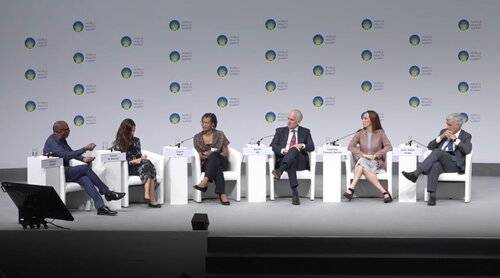UHC2030 is excited to welcome several new and distinguished...
25 October 2023
On October 15 – 17, about 3,500 stakeholders came together at the World Health Summit in Berlin to discuss the most pressing global health issues.

Universal Health Coverage (UHC) was one of the central topics of the conference. Experts met on various panels to discuss ways to bring progress back on track for the implementation of UHC.
UHC2030 co-hosted a session with the Partnership for Maternal, Newborn and Child Health (PMNCH) and the United Nations Children’s Fund (UNICEF). During the session, Svenja Schulze, the German Federal Minister for Economic Cooperation and Development, stressed that following the commitments made at the High-Level Meeting on UHC, it is now time to implement UHC in countries. “The UHC declaration was a really good sign. Our heads of state said, ‘We want to deliver’. Now we need financing and country-led solutions in every country.”
Gabriela Cuevas Barron, Co-Chair of the UHC2030 Steering Committee, made a call for stronger political determination to strengthen UHC. She emphasized that following the High-Level Meeting on UHC and the adoption of the Political Declaration in September, leaders now have a clear roadmap on how to make UHC a reality for all. She called on governments to “build a bridge between these international commitments and the local realities” by strengthening health systems through a primary health care approach. Cuevas Barron also urged governments to see the implementation of UHC as an opportunity to rebuild public trust lost during the pandemic.
Dr Juan Pablo Uribe, the World Bank’s Global Director for Health, Nutrition & Population and the Global Financing Facility, underlined the importance of UHC in achieving the overall goal of health for all. “Out of all the health policy discussions (…), the one on UHC is the most important. It really covers all that we want do in the many more particular and granular aspects of our health expectations.”
Catherine Russel, Executive Director of UNICEF, underlined the importance of working directly with the affected communities through community health workers. “Community health workers are so successful because they know the communities’ needs.”
Dr Omnia El Omrani, Youth Envoy to the President of the UN’s 27th Climate Change Conference, brought up the role of UHC in preparing for and responding to climate change: “If we talk about UHC, we need to think about how we can adapt it to the challenges that we will now face every day.” She also underlined the need for an equitable approach: “How can we make sure that UHC is actually based on needs, insights, data and lived experiences of those affected the most?”
Loyce Pace, Assistant Secretary for Global Affairs at the U.S. Department of Health and Human Services, underscored the importance of including the needs of women and girls in discussions around UHC. “We cannot talk about UHC without talking about sexual and reproductive health and rights. (…) SRHR is core to delivering on this goal.”
Kevin Ali, CEO of Organon, added that there is a need to establish a holistic view of women’s health. In their final statements, speakers agreed that now is the time to move from commitment to action.
Throughout the conference, UHC2030 was represented at several events. Laetitia Bosio, UHC2030 Program Manager, spoke about youth representation in global health decision-making processes. Urging young people to make their voices heard and their votes count, she pointed out that UHC2030 provides a platform for young people to engage in global discussions on UHC.
Moreover, members of UHC2030’s Political Advisory Panel, including Prof Keizo Takemi, Prof Ilona Kickbusch, Dr Sania Nishtar, Joy Phumaphi and Elhadj As Sy, participated in various sessions, along with members of the Civil Society Engagement Mechanism for UHC2030 (CSEM), including Dumi (Success Capital, Botswana), Margot Nauleau (Save the Children International), Rosemary Mburu (WACI Health, Kenya) and Smitha Sadasivan (Multiple Sclerosis Society of India).
The speakers shared a clear message: UHC based on a primary health care approach is key to ensuring health for all. It is the most effective and equitable way to do so because it specifically addresses the needs of the most marginalized and vulnerable people, including women, children and adolescents. UHC is also closely linked to health security and to preparing health systems for the challenges of climate change. Speakers agreed that what is needed now is the political will to implement UHC and the necessary funding to do so.
